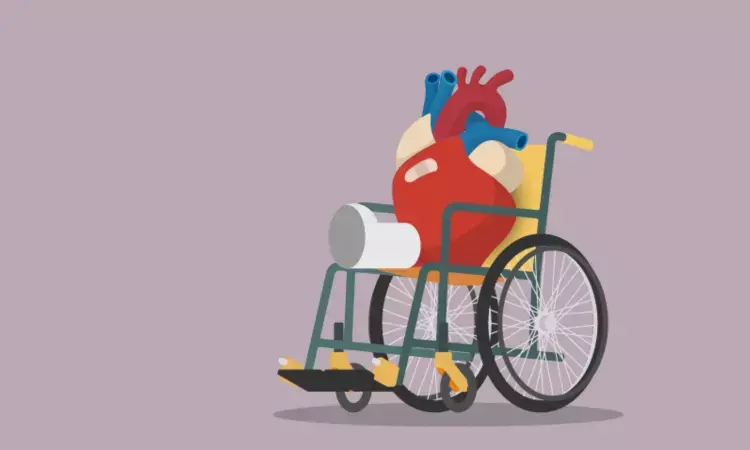- Home
- Medical news & Guidelines
- Anesthesiology
- Cardiology and CTVS
- Critical Care
- Dentistry
- Dermatology
- Diabetes and Endocrinology
- ENT
- Gastroenterology
- Medicine
- Nephrology
- Neurology
- Obstretics-Gynaecology
- Oncology
- Ophthalmology
- Orthopaedics
- Pediatrics-Neonatology
- Psychiatry
- Pulmonology
- Radiology
- Surgery
- Urology
- Laboratory Medicine
- Diet
- Nursing
- Paramedical
- Physiotherapy
- Health news
- Fact Check
- Bone Health Fact Check
- Brain Health Fact Check
- Cancer Related Fact Check
- Child Care Fact Check
- Dental and oral health fact check
- Diabetes and metabolic health fact check
- Diet and Nutrition Fact Check
- Eye and ENT Care Fact Check
- Fitness fact check
- Gut health fact check
- Heart health fact check
- Kidney health fact check
- Medical education fact check
- Men's health fact check
- Respiratory fact check
- Skin and hair care fact check
- Vaccine and Immunization fact check
- Women's health fact check
- AYUSH
- State News
- Andaman and Nicobar Islands
- Andhra Pradesh
- Arunachal Pradesh
- Assam
- Bihar
- Chandigarh
- Chattisgarh
- Dadra and Nagar Haveli
- Daman and Diu
- Delhi
- Goa
- Gujarat
- Haryana
- Himachal Pradesh
- Jammu & Kashmir
- Jharkhand
- Karnataka
- Kerala
- Ladakh
- Lakshadweep
- Madhya Pradesh
- Maharashtra
- Manipur
- Meghalaya
- Mizoram
- Nagaland
- Odisha
- Puducherry
- Punjab
- Rajasthan
- Sikkim
- Tamil Nadu
- Telangana
- Tripura
- Uttar Pradesh
- Uttrakhand
- West Bengal
- Medical Education
- Industry
Continuous ECG monitoring enhances detection of AF after cardiac surgery: JAMA

In post-cardiac surgical patients, continuous cardiac rhythm monitoring enhances detection of Postoperative atrial fibrillation (POAF), suggests a study published in the JAMA Netw. Open.
Postoperative atrial fibrillation (POAF) occurring after cardiac surgery is associated with adverse outcomes. Whether POAF persists beyond discharge is not well defined.
A group of researches from Canada conducted a study to determine whether continuous cardiac rhythm monitoring enhances detection of POAF among cardiac surgical patients during the first 30 days after hospital discharge compared with usual care.
This study is an investigator-initiated, open-label, multicenter, randomized clinical trial conducted at 10 Canadian centres. Enrollment spanned from March 2017 to March 2020, with follow-up through September 11, 2020. As a result of the COVID-19 pandemic, enrollment stopped on July 17, 2020, at which point 85% of the proposed sample size was enrolled. Cardiac surgical patients with CHA2DS2-VASc (congestive heart failure, hypertension, age ≥75 years, diabetes, prior stroke or transient ischemic attack, vascular disease, age 65-74 years, female sex) score greater than or equal to 4 or greater than or equal to 2 with risk factors for POAF, no history of preoperative AF, and POAF lasting less than 24 hours during hospitalization were enrolled.
The intervention group underwent continuous cardiac rhythm monitoring with wearable, patch-based monitors for 30 days after randomization. Monitoring was not mandated in the usual care group within 30 days after randomization.
The primary outcome was cumulative AF and/or atrial flutter lasting 6 minutes or longer detected by continuous cardiac rhythm monitoring or by a 12-lead electrocardiogram within 30 days of randomization.
The results of the study are as follows:
- Of the 336 patients were randomized, 307 completed the trial.
- In the intent-to-treat analysis, the primary endpoint occurred in 32 patients in the intervention group vs 3 patients in the usual care group.
- AF lasting 6 hours or longer was detected in 14 patients in the intervention group vs 0 patients in the usual care group.
Thus, the researchers concluded that in post-cardiac surgical patients at high risk of stroke, no preoperative AF history, and AF lasting less than 24 hours during hospitalization, continuous monitoring revealed a significant increase in the rate of POAF after discharge that would otherwise not be detected by usual care. Studies are needed to examine whether these patients will benefit from oral anticoagulation therapy.
Reference:
Effect of Continuous Electrocardiogram Monitoring on Detection of Undiagnosed Atrial Fibrillation After Hospitalization for Cardiac Surgery: A Randomized Clinical Trial by Ha A et. al published in the JAMA Netw. Open.
doi:10.1001/jamanetworkopen.2021.21867
Dr. Shravani Dali has completed her BDS from Pravara institute of medical sciences, loni. Following which she extensively worked in the healthcare sector for 2+ years. She has been actively involved in writing blogs in field of health and wellness. Currently she is pursuing her Masters of public health-health administration from Tata institute of social sciences. She can be contacted at editorial@medicaldialogues.in.
Dr Kamal Kant Kohli-MBBS, DTCD- a chest specialist with more than 30 years of practice and a flair for writing clinical articles, Dr Kamal Kant Kohli joined Medical Dialogues as a Chief Editor of Medical News. Besides writing articles, as an editor, he proofreads and verifies all the medical content published on Medical Dialogues including those coming from journals, studies,medical conferences,guidelines etc. Email: drkohli@medicaldialogues.in. Contact no. 011-43720751


